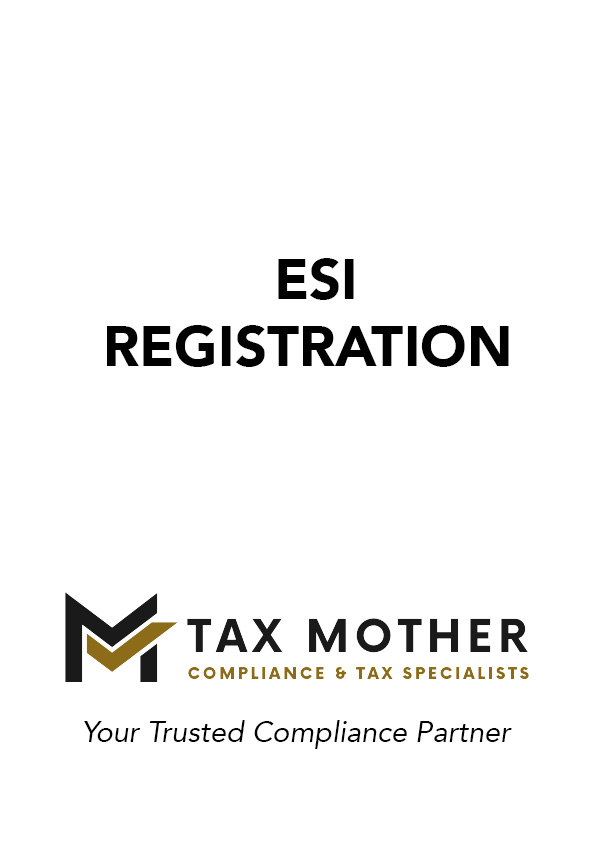The Employees’ State Insurance (ESI) Act is a vital social security legislation in India that aims to provide comprehensive benefits to employees working in specific establishments. The Act mandates employers to register their establishments and employees for ESI benefits, which include health insurance and other social security provisions.
ESI registration is mandatory for establishments employing ten or more employees, including contract or temporary employees. The Act applies to various sectors such as manufacturing, construction, medical, educational, and other specified industries. Once registered, both the employer and employees become eligible for ESI benefits.
The process of ESI registration involves the following steps:
1. Employer Registration: The employer is required to submit an application for ESI registration to the concerned Regional Office of the Employees’ State Insurance Corporation (ESIC). The application should include details such as the name of the establishment, address, type of business, and other relevant information.
2. Employee Details: The employer must provide employee details, including names, addresses, wages, date of joining, and other necessary information as required by the ESIC. This information is essential for the identification and inclusion of eligible employees in the ESI scheme.
3. Registration Certificate: Upon successful verification of the application and employee details, the ESIC will issue a Registration Certificate to the employer. The certificate contains the employer’s code number, establishment details, and other relevant information. It serves as proof of ESI registration and must be prominently displayed within the establishment.
Once registered, employers are required to contribute a percentage of the employees’ wages to the ESI fund on a monthly basis. The contribution rates are determined by the government and are based on the total wages payable to employees. The contributions are used to fund the various benefits provided under the ESI scheme.
Employers are also responsible for filing regular returns to the ESIC. These returns provide details of wages, contributions paid, and other necessary information as per the prescribed format. Compliance with contribution payments and return filing is crucial to ensure the uninterrupted provision of ESI benefits to employees.
ESI registration under ESI act offers several benefits to both employers and employees, including:
– A factory, under the ESI Act, refers to any premises, including its precincts, where ten or more persons are employed or were employed for wages on any day of the preceding twelve months.
– It is not necessary for all employees to be engaged in the manufacturing process; they may be employed in various departments or functions within the factory premises.
– The manufacturing process carried out within the factory can be with or without the aid of power.
– Seasonal factories, which operate for a period not exceeding seven months in a year and are involved in specific processes like blending, packing, repackaging of tea or coffee, or other notified manufacturing processes, are also considered as factories under the ESI Act.
– However, mines (subject to the Mines Act, 1952) and railway running sheds are excluded from the definition of a factory under the ESI Act.
– An establishment, as per the ESI Act, refers to an organized body of men or women or an institution, and it is not limited to a specific premises or location.
– For establishments to come under the purview of the ESI Act, they must employ 20 or more persons.
– Establishments employing less than 20 employees with wages below Rs. 21,000 per month are exempted from obtaining ESI registration.
– Shops are also considered establishments and need to be registered under the ESI Act. The term “shop” is interpreted broadly by the Supreme Court to include premises where economic activities related to sale or purchase are carried out.
– However, certain establishments such as educational institutions, hospitals, dispensaries, offices of auditors, solicitors, chartered accountants, and private commercial hospitals are excluded from the coverage of the ESI Act.
It is essential for employers to understand the definitions of factory and establishments under the ESI Act to determine their obligations and comply with the necessary registration and contribution requirements for the welfare of their employees.
ESI registration and compliance can sometimes be complex for employers. It is advisable to seek professional assistance to ensure accurate registration, timely contribution payments, and adherence to regulatory requirements. At Tax Mother, we offer expert guidance and support for ESI registrations and compliance.
Our team of professionals can assist you in understanding the process, completing the necessary paperwork, and ensuring compliance with ESI regulations.

